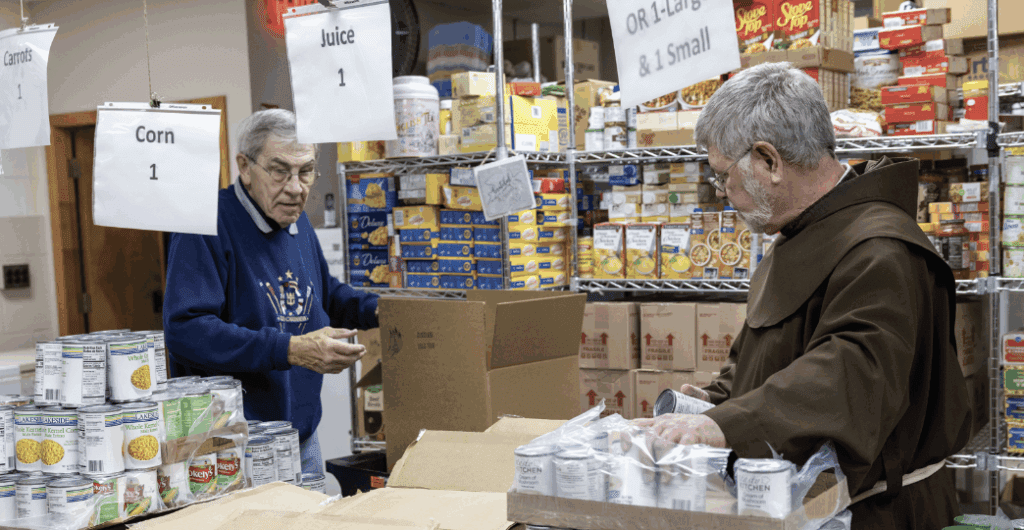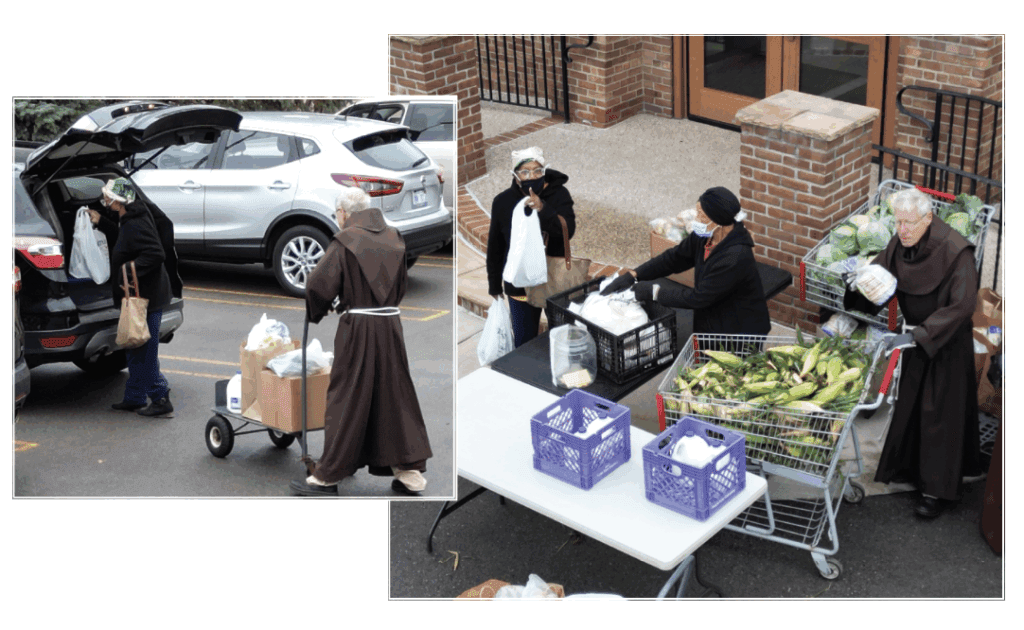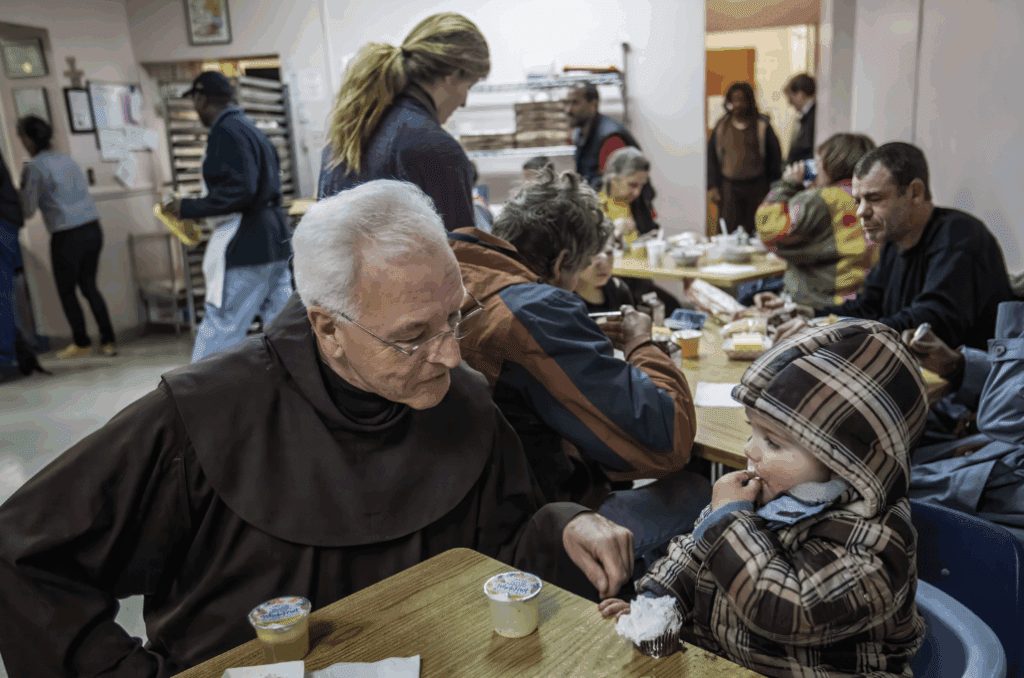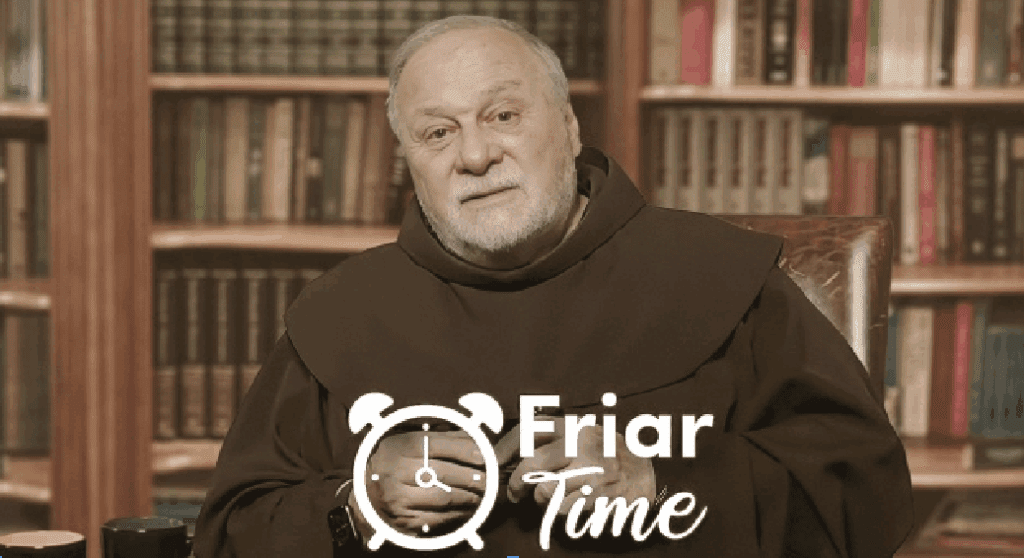Featured In The Franciscan Way Magazine: Spring 2025

American history was made in 1539 when the first friars established missions among the Native peoples in present-day Arizona and New Mexico. In the nearly 500 years since then, the Franciscan Friars in the U.S. have brought ministries of kindness and care to millions of poor, hungry, sick and homeless in the U.S. and abroad.
The fact that we’ve delivered these life-saving ministries in separate regions of the country without collaboration or sharing our resources with each other is truly amazing.
Individually, the friars of the U.S., Puerto Rico, and Cuba were united in our calling and commitment to serve those in need. Still, our separate regional communities, also called provinces, did not present a united front. A few years ago, the state of the world and the growing needs of the poor around the country motivated us to ask a very important question:
Is uniting the regions necessary to help more people and develop a stronger sense of friar life among ourselves?
We began to imagine how we could be stronger together — how uniting our U.S. regions could expand and enrich our three-pronged mission to help the poor, better prepare our young friars for ministry and provide a dignified retirement to friars who had retired from active ministry.
After all, nations, workers, service providers and superheroes have united for years, forming stronger connections and sharing resources that better prepare them for hard times and significant milestones.
Why not us? Why can’t we be Franciscan Avengers?
And while I would never say the humble servants of St. Francis are superheroes, our ministries urgently need to supercharge our ability to expand and serve more people across our country.
And what if uniting the regions would help us build relationships with friars from around the country and enhance our ministerial outreach?
We owed it to the over two million people we serve — and those who might someday need our services — to make it happen. So, the friars of the U.S., Puerto Rico and Cuba discussed the idea of coming together as one unified brotherhood, inspired by the words of St. Francis:
“Start by doing what’s necessary; then do what’s possible; and suddenly you are doing the impossible.”

St. Francis also said, “It is in giving that we receive.” After some prayerful reflections and sharing of ideas and opinions, the friars agreed that uniting enables us to live strong fraternal lives and enrich and expand our numerous outreach ministries. United regions can deliver stronger charitable messaging, boost the confidence of potential and existing benefactors and enrich the education and care of friars, young and old.
In the fall of 2023, the Franciscan friars in the U.S., Puerto Rico and Cuba made history by forming one new region (province) placed under the patronage of Our Lady of Guadalupe and named after her. The new province is called The Province of Our Lady of Guadalupe.
And the Franciscan Avengers are born!
With the friars of the regions (provinces) united, a new and efficient way to donate was also born. The new national province created a new charity, so our donors can now go to a single source if they want to make an impact with small or super acts of generosity. The name chosen by the friars was Franciscan Friars Charities, three words that perfectly sum up the mission of the new charity. Franciscan Friars Charities brings all the former provinces and their fundraising efforts into the one new province.

And so marked the beginning of a new era for Franciscan life and ministry — a chance to renew our commitment to living the Gospel as one voice in the U.S. and Cuba. Now there will be over 600 Franciscan friars united and ready to continue our Franciscan Mission domestically and abroad, in ministries where:
•The homeless, unemployed, and addicted are welcome to find shelter, help with their résumés, counseling and information on local resources.
•The poor, hungry and suffering can receive a hot meal and medical care.
•Women who live in fear of the next moment and often fall victim to physical abuse can find safety and companionship.
•People who live in remote and underserved communities can access a food bank, community gatherings and culturally sensitive worship services.
•Children who live in poverty-stricken rural areas can receive meals, as well as school supplies and round trip transportation to schools and training programs.
•Mothers in one of the world’s most strife-ridden regions can learn essential skills to care for their sick and afflicted children.
Two of the gentle themes of the ongoing biweekly podcast “Friar Time,” hosted by Father David Convertino, OFM, are discussions in controversial and sensitive areas. In its first season, over 11 programs, “Friar Time” has explored LGBTQ+ issues, the church and politics, homelessness, depression and anxiety, along with a roster of personal and societal concerns. Father David, executive director of the Franciscan Office of Development, said he wanted to communicate Franciscan compassion and care to listeners and viewers.
The vehicle for that is discussions on topics that are either not talked about, hidden away or perhaps discussed too much with invective and hectoring. Father David, a trained counselor, brings a listening ear and raises questions, but largely lets his guests tell their stories, gently prodding them to reveal how their struggles relate to those of his listeners.
“It helps people feel better about themselves,” he said, describing the impact of the programs.
There is no preaching or arguing firmly entrenched points of view. Friars and other guests offer insights into their personal journeys, with candor and empathy for others going through similar problems.
“We are trying to hit particular subjects where people are involved in their daily lives,” said Father David. Sometimes that can involve concerns ripped from the headlines, such as a segment on politics as Catholics and others debated the 2024 election.

But mostly it involves frank one-on-one chats, mostly with friars, about handling personal issues well beyond political matters.
Brother Bill Herbst, OFM, shared what it was like when he first heard that he had esophageal cancer. Just weeks after Brother Bill was diagnosed, Father David asked him what it was like to first hear about a cancer diagnosis from a physician.
“At first I took it gently,” he said. “And then my doctor started to cry. I knew then I was in trouble,” Brother Bill said. And, in a moment of candor, he added, “There was a fear that swept over me. All I could do was take my faith in God and carry on.” With a calm, matter-of-fact demeanor, Brother Bill described the exhausting regimen of chemotherapy he was undergoing and thanked the friar community for being there for him. Father David said he planned on checking in with Brother Bill as he battles cancer on future programs.
Other “Friar Time” episodes feature friars bravely taking on different personal struggles.
Father Frank Critch, OFM, described his ongoing battle with depression, a struggle so debilitating he was forced to take time away from his work as a pastor in New Jersey to recover. Even after a stint at a mental health facility for clergy in Pennsylvania, Father Frank said he still fights feelings of hopelessness. The symptoms are familiar to those who have gone through depression or know someone who has.
“It took all the joy out of my life,” said Father Frank, who felt more isolated after the deaths of his brother and sister. Like many others who suffer from depression, he experienced anxiety, insomnia, and irritability towards others.
“Nothing felt right. There was something wrong with everything I did. I didn’t want to be around anybody,” Father Frank said. With the help of talk therapy, medication, the support of his friars community and the postcards of support sent by parishioners, Father Frank said he was getting better but was still struggling.
In “Friar Time,” the message is clear: few issues can be neatly resolved in the course of an hour’s program. The struggle will continue.
Stewart Waddin, a New York-based chef, in another episode of “Friar Time,” described what it was like to know that his brother was homeless on the streets of Toronto. “It took us years to track him down,” said Waddin, a Canadian, noting the long search by his family for his brother. He said his brother, now 60 years old, had a long battle with mental illness that caused him to live on the streets and in a shelter.
The family only connected with him when his sister, a librarian, happened to run into him at her work; many homeless people find libraries a comforting place to be during the day.
Families suffer along with the person who is homeless, noted Waddin. He described his family as filled with high-performing professionals, including doctors and engineers, who had difficulties relating to the struggles of his homeless brother. “We didn’t know he was unwell. We couldn’t understand why he couldn’t figure it out,” said Waddin.
He has not been in direct communication with his brother, who prefers to remain isolated. But that knowledge about his own family has changed Waddin’s perspective. He makes it a point to greet the homeless on the streets of New York, talking to them, hearing their stories and occasionally providing some support.
Another episode of “Friar Time” featured Brother George Camacho, OFM, who described what it was like to be a friar who is gay.
Brother George emphasized that in his ministry life as a Franciscan, “we are called to bring Jesus to life.” Part of that is sharing, in the context of a commitment as a religious celibate, that he is a gay man, “a gift that has come with a great deal of pain.”
As a Franciscan, he is dedicated “to building bridges with the poor and marginalized.” The church, he said, can retain its teachings on homosexuality but should “err on the side on inclusion” in the way it interacts with the LGBTQ community.
Father David noted that the 11 original episodes of “Friar Time,” made over the course of last year, pulled no punches. He is planning another series of programs for this year. So far, he’s been impressed by the reaction.
“It’s really hit home in a lot of ways. It’s created a lot of buzz,” he said. While the show largely features Franciscans, the goal is to connect their struggles with the lives of everyone. Listeners include both lay and religious people living through the issues of depression, anxiety, coping with cancer and perhaps confused about issues ranging from the church in politics to living with a gay orientation as a religious Catholic.
“The feelings are the same,” said Father David, noting that the program emphasizes the common ground faced by both friars and those in lay life. For example, he noted that those faced with a cancer diagnosis have similar questions, whether they are friars or not. “Why me?” he said, is a question that is faced by everyone confronting a life-altering condition.
The airwaves and social media channels are filled with religious programs exhorting and preaching. “Friar Time” is different, said Father David, because it builds upon the friars’ reputation as merciful and non-judgmental. Friars come across as non-experts who have gained knowledge through their personal struggles.
“It’s different because these are actual friars going through this, talking about it,” he said. “It’s more like ‘this is us.’”
We are like you. This is how we got through it.”
The goal, he said, is for listeners and viewers to come away “feeling better about themselves, that they are not alone.” Father David feels that approach is worth sharing, for both friars and non-friars alike.
